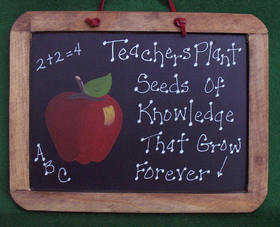 Without a doubt, technology is no longer a minor part of education. My experience with computers as a high school student (early to mid 80s) simply involved using one to type a paper for English class and creating flow charts in computer class on Wang computers. Since then, technology has become a fundamental part of our daily lives as well as education at every level. As a result of an insatiable thirst for instant information in our society, it’s become paramount that schools “keep up”. Often times, this means altering and/or adopting methodologies that will best harness technology as an instrument to enrich and support learning opportunities. I have read and heard discussions with the prevailing thought of computers inevitably replacing teachers. I think a lot of people underestimate the value of teachers and the influence they can have on their students. “Teachers affect eternity; No one can tell where their influence stops.” ~Henry Brooks Adams These are six reasons why I don’t think computers will ever fully replace teachers. 1. Relationship Building - Teachers will take interest in their students as people and learn about their activities outside of the classroom. I made sure to periodically talk with students about their lives away from school. It allowed me to get to know them better (learning things I would not have ever known) and in turn for them to know more about me aside from being their teacher. When invited, I would also attend plays, athletic competitions, recitals, etc. It was truly amazing to see those students in different environments. Often times, they seemed the complete opposite of their school persona. 2. Teaching To Multiple Learning Styles - Everyone learns and thinks differently. Regardless of the modality of learning (auditory, kinesthetic or visual) teachers will provide differentiated instruction to accommodate the needs of their students. Examples of this can be using a math game to reinforce basic math skills, varying delivery style for a lesson (hands-on activity for kinesthetic learners), or group activities (grouping students to allow for success based upon their skill set). 3. Field Trips/Special Events - Teachers spend an inordinate amount of time planning lessons and experiences for their students. The kids will have fond memories these experiences when they reflect upon their time as your student. This is definitely true as I have experienced it. Some of the experiences my former students recall are team building activities, field trips and musicals they performed as a grade level. I still remember them too! Technology is not able to provide these type of experiences. 4. Role Model/Mentor - Teachers serve as role models every minute of every day. It is a major element of who they (we) are and what they undertake. Many students learn from their teacher(s) simply through observation while others learn more directly. This is a responsibility the majority of teachers take seriously. 5. Flexibility - A major part of teaching is having the ability to be flexible. Most teachers will give great effort to do what is necessary for their students to succeed. Every teacher creates lesson plans, but anyone who has taught (in any capacity) knows that things don’t always go as planned. Teachers must be cognizant of times when their students are experiencing difficulty (give students a short break or end the lesson and continue the next day) as well as when concepts need to be covered in more depth. I think being flexible also includes doing something different every now and then. For example, when I taught fourth grade I would read to the class after lunch each day for 15 - 30 minutes. We would periodically change our location. Sometimes we stayed in the classroom. Sometimes we would go outside and sit under a shade tree, or go to the Storytelling Room adjacent to the library. As much as students like routine and predictability, they enjoy a change of pace and appreciate it when it happens. 6. Leadership - Great teachers inspire students to undertake leadership roles, accept academic challenges, become confident in their academic abilities, and become agents of change. They recognize strengths and encourage kids to reach their full potential as students and as individuals. In elementary school, this is often accomplished by giving students appropriate opportunities to develop as leaders (typically, but not limited to, classroom jobs). At any level, taking time to work with a student one on one, covering a concept they are having difficulty with, exhibits genuine concern about that student’s success. An example of this is having a one on one conversation with a student that is having social, academic and/or issues at home. In order to provide effective leadership, one has to gain the respect and trust of their students. Once that is accomplished, you will be amazed at the positive influence a teacher can have. Technology is a powerful tool that can facilitate student learning.Teachers that are resistant to effectively incorporating technology into their curriculum risk hindering their students’ development into a 21st century learners.
0 Comments
Leave a Reply. |
AuthorRandy Sally Archives
June 2023
Categories
All
|

 RSS Feed
RSS Feed
